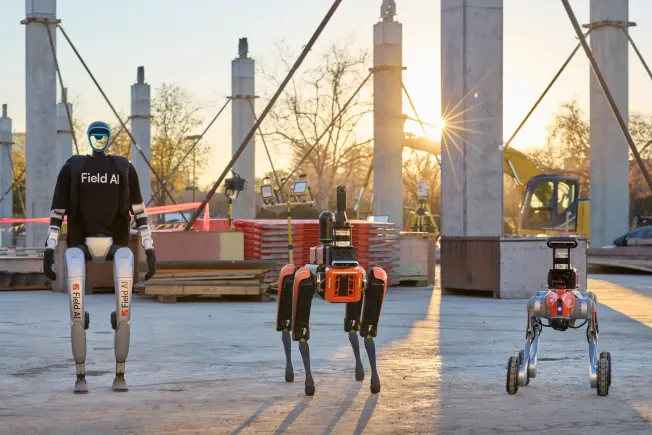Listen to the article
Dive Brief:
Irvine, California-based FieldAI, a startup that focuses on physical artificial intelligence for robots, has raised $405 million across two consecutive funding rounds, the company announced on Aug. 20, as builders look for proven tech solutions to add to their jobsites. The rounds bring the company’s total valuation to $2 billion, according to CNBC.
The tech allows for safe and reliable robot behaviors when managing scenarios that they have not been trained on and navigating dynamic, unstructured environments without prior maps, GPS or predefined paths, according to the news release.
The startup’s “single software brain” for robots has been deployed in the U.S., Japan and Europe across hundreds of real-world industrial environments, including construction jobsites.
Dive Insight:
The firm’s latest funding round was oversubscribed, which means the company received more funding commitments than it planned, following rapid customer adoption for FieldAI’s general-purpose robotics intelligence, according to the news release.
Kaushal Diwan, corporate director of strategic investments and partnerships for WND Ventures, the venture capital arm of Redwood City, California-based DPR Construction, said that the raise is a sign that people can expect larger funding rounds, particularly for robotics, in the construction space.
“AI is helping robots go from single-task to dynamic operation faster. All of these things will require a significant commitment from the investors,” Diwan said in an email. WND Ventures is not an investor in FieldAI, but DPR sites have helped test proof of concept for the firm.
The core of FieldAI’s platform is what it calls its Field Foundation Models, which are built specifically for embodied intelligence, and are physics-first, according to the company. Unlike conventional vision or language models retrofitted for robotics, FieldAI designs FFMs to grapple with uncertainty, risk and the physical constraints of the real world.
“Rather than attempting to shoehorn large language and vision models into robotics — only to address their hallucinations and limitations as an afterthought — we have designed intrinsically risk-aware architectures from the ground up,” said Ali Agha, founder and CEO of FieldAI, in the news release.
FieldAI specifically highlights the tech’s ability to capture real-time data on jobsites to generate accurate building information models.
For years, builders and experts have debated whether robots — particularly of the humanoid variety — would soon join construction workers on the jobsite.
The sector has gained prominence among investors. Approximately 55% of the $3.55 billion invested in construction technology in Q1 2025 went toward funding next-generation robotics and AI-enabled technology, according to a report from Chicago-based venture capital firm Nymbl Ventures.
Yet, actual deployments have been mixed. Contractors have recently seen robotics usage drop, despite positive reactions to the tech, according to Chicago-based research platform BuiltWorlds. In its latest Equipment & Robotics Benchmarking report, the firm found that positive evaluations of the innovative equipment jumped from 74% in 2024 to over 95% this year. However, the share of firms reporting active robotics use fell from 65% last year to 46% now.
Some of FieldAI’s high-profile investors include Bezos Expeditions, which manages Amazon founder Jeff Bezos’ private investments; Intel Capital, the global venture arm of computer giant Intel; and NVentures, NVIDIA’s venture capital arm. Gates Frontier, the venture investment arm of Microsoft co-founder Bill Gates, and Samsung have also backed the firm.
Going forward, the company will use its latest funding to accelerate FieldAI’s global growth, support continued product development across locomotion and manipulation and enable strategic hiring to scale its team as it plans to double headcount by the end of the year, according to the news release.


